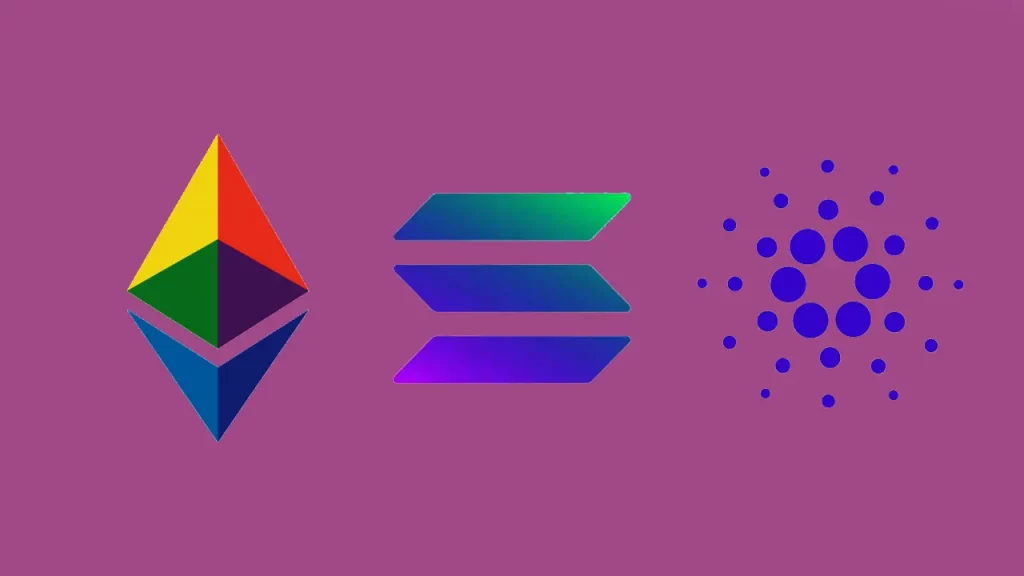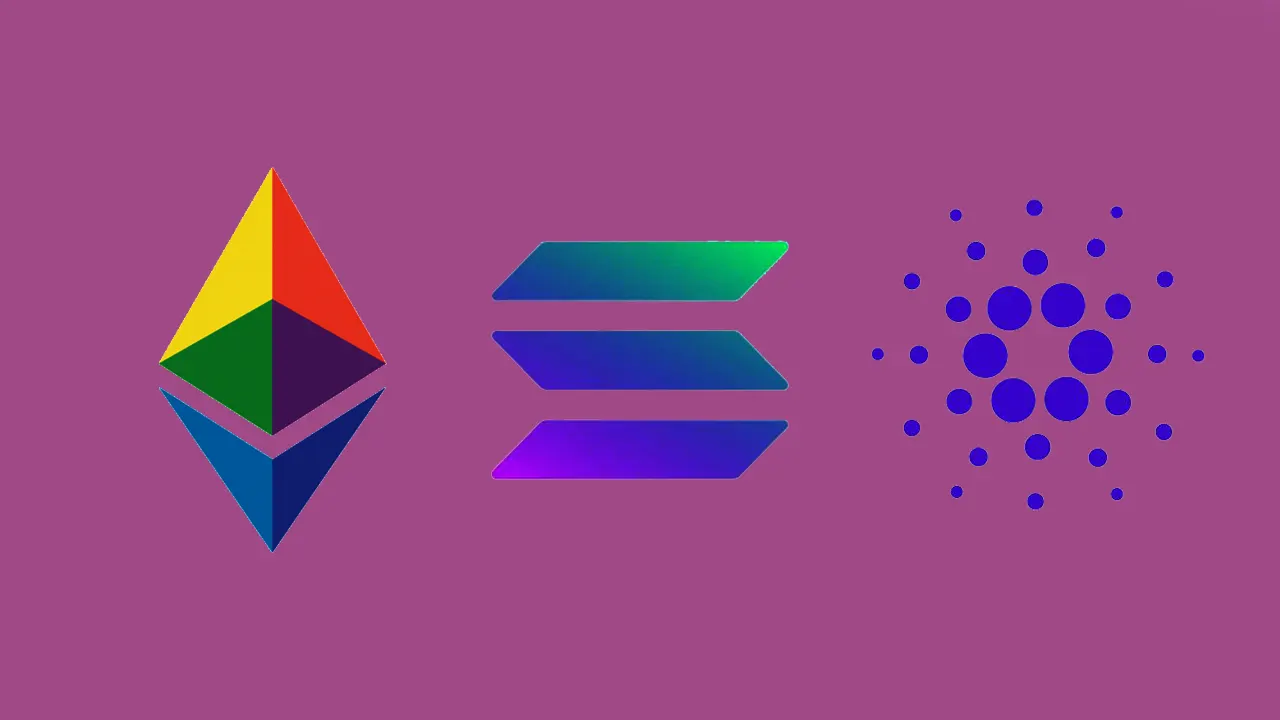Do you believe in Ethereum and its power to influence the future? After all, Ethereum is the most well-known blockchain after Bitcoin. And it even has something that the king coin doesn’t have – NFTs. However, there are other contenders like Solana and Cardano with rising potential, which are on the cusp of challenging Ethereum and probably overtaking it. To ascertain which blockchain has better prospects, we are analyzing Ethereum vs. Solana vs. Cardano in terms of their current and future potential.
Considering the state of affairs today, we can clearly say that Ethereum is ahead of other blockchains like Solana and Cardano. However, the future is not always what we think it will be. Instead, it keeps on surprising us. So, we can never say with any degree of certainty which blockchain might usurp Ethereum and become the de-facto platform for hosting NFTs, Dapps, and DeFi contracts. So, let’s have a look at a few Ethereum and its competitors, Solana and Cardano, in detail.
Ethereum vs. Solana (ETH vs. SOL)
Ethereum is a much older project than Solana. Vitalik Buterin launched Ethereum in 2015. On the other hand Solana was launched in 2020.
Currently, Ethereum is totally dominant in the market. However, Solana follows it closely, which is heavily supported by the NBA community. For instance, Michael Jordan’s HEIR project runs on Solana. Even Shaquille O’Neal supports Solana and has tweeted about his allegiance to SOL.
Transaction Speed
Solana has tremendous potential to develop because of its faster blockchain. Do you know that Solana has a Transaction per Second (TPS) of 50,000 TPS and Ethereum just 30 TPS? So, Solana is a clear winner in this case.
Winner: Solana
Decentralization
But before taking these numbers to heart and immediately vouching for Solana, you should know that Solana has certain limitations because of its breakneck speed. For instance, Solana is considerably less decentralized than Ethereum.
Decentralization is one of the most highly rated virtues of blockchains and cryptocurrencies. So, Ethereum definitely scores on that front and hence, has a more prominent name than Solana.
Winner: Ethereum
Easier to Validate
Moreover, it is worth noting that Solana puts a tremendous load on its validators. As less decentralization means fewer people validating Solana, they need to have more powerful systems to cross the threshold to becoming a Solana validator.
You cannot be a Solana validator if you don’t own a computer with at least 12 CPU cores (although they would want you to have more). Apart from that, your computer needs to be fitted with a minimum of 128 GB RAM as well as 1TB SSD to store the Ledger. In contrast, Ethereum’s soon-to-be-launched version 2 has very modest requirements – 4th Generation I7 Processor, 8GB RAM, and 100 GB SSD. Therefore, it is likely that most people will choose to validate Ethereum 2.0 instead of Solana.
Winner: Ethereum
Fork Attack Risk
Due to the lack of decentralization, there is also a higher risk of someone controlling the majority of nodes and then forking the network. For instance, if a hacker gains control of over 51% of nodes, they can create a second version of the blockchain that does not reflect certain transactions. The hacker can designate the forked versions as accurate and even double-spend cryptocurrencies. As Ethereum has more decentralization, It is harder to hack Ethereum than Solana.
Winner: Ethereum
10 Early Signs of Ethereum Overtaking Bitcoin in 2022

Ethereum vs. Cardano (ETH vs. ADA)
Ethereum is an older project than Cardano. Ethereum was launched in 2015 while Cardano came into existence in 2017.
Transaction Speed
At the time of writing, Cardano has a transaction speed of 2500 TPS. Therefore, it is ahead of Ethereum 1.0’s 30 TPS.
Winner: Cardano
Decentralization
Ethereum’s relatively lower transaction rate means it offers better decentralization than Cardano. But it is worth noting that Cardano developers are currently working on a Hydra update with a projected transaction rate of 2500 TPS, just like Vitalik Buterin’s team is working on Ethereum 2.0, which will have a transaction rate of 100,000 TPS. Both Cardano and Ethereum have higher decentralization than blockchains like Solana, making them less prone to be compromised by hackers.
Winner: Ethereum
Easier to Validate
Cardano has lower hardware requirements than Ethereum 2.0. For instance, Cardano only requires a 2-core processor instead of a 4th Generation I7 processor recommended by ETH developers. RAM and SSD requirements are almost similar for both cryptos.
Winner: Cardano
Scalability
Both Cardano and Ethereum are almost similar in terms of scalability. Due to a lower transaction rate, there are instances when the load builds up and causes the transactions to move extremely slowly. As a result, the transactions become expensive. There is no clear winner between Ethereum and Cardano in terms of scaling. However, with Hydra and Ethereum 2.0 incoming, we can expect more incredible things from both blockchains.
Draw
Developers
The developers of both blockchains are known for their charisma. Vitalik Buterin is a nerdy geek with deep insights and charitable intentions.He even donated $1 billion in Shiba Inu (meme crypto using Ethereum blockchain) to India to fight against Covid in 2021. On the other hand. Cardano’s developer Charles Hoskinson is also known for his aura and anticipatory updates. Hoskinson frequently launches videos about Cardano updates to keep the project in good health.
Draw
Cardano vs. Solana (ADA vs. SOL)
Cardano is an older project than Solana. Cardano was released in 2017 while Solana was launched in 2020.
Transaction Speed
Cardano pales in comparison to Solana in terms of transaction rate. Solana’s transaction rate is sky-high and a whopping 50,000 TPS. On the contrary, Cardano only has a transaction rate of 2500 TPS.
Winner: Solana
Decentralization
Cardano is much more decentralized than Solana. Therefore, it is less prone to getting hacked using a majority attack, also known as a 51% attack in the crypto world.
Winner: Cardano
Scalability
Solana is faster and more scalable than Cardano because of its higher transaction rate.
Winner: Solana
Easier to Validate
Cardano has much lower hardware requirements than Solana Cardano only requires a 2-core processor. On the other hand, Solana requires at least a 12-core CPU, a minimum of 128 GB RAM as well as 1TB SSD.
Winner: Cardano
Developers
The developer of Solana is Yakovenko. He was born in Ukraine and moved to the US as a teenager. Solana developer Charles Hoskinson is known for being very active within the community.
Draw
Solana vs. Cardano vs. Ethereum (SOL vs. ADA vs. ETH): Battle for DeFi Supremacy
Apart from the speed and decentralization, the blockchains are rated for their performance in DeFi. Ethereum is far ahead of Solana and Cardano in this respect.
At the time of writing, the Total Value Locked (TVL) of Ethereum in DeFi contracts is US$ 39.99 Billion.
The Total Value Locked (TVL) of Ethereum in DeFi contracts is US$ $2.39 Billion.
.The Total Value Locked (TVL) of Ethereum in DeFi contracts is US$ $117.38 Million.
Conclusion
Currently, Ethereum is way ahead of the competition in terms of market capitalization and has most of the world’s DeFi contracts. However, other emerging blockchains like Cardano and Solana are racing ahead at blistering speed. Cardano and Solana are headed by charismatic developers looking to improve their blockchains’ transaction rate, security, and scalability. But despite all their efforts, Vitalik Buterin’s creation of Ethereum is gaining ground as I write and you read. With Ethereum 2.0 well in the works, we can Ethereum maintain its strong position unless something drastic happens in the near future.

